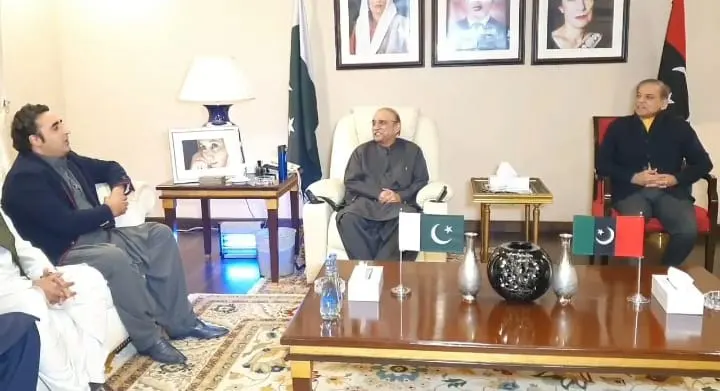Fida Hussnain Islamabad
The Election Commission of Pakistan (ECP) has announced official results for the majority of constituencies, revealing a fragmented political landscape.
However, the outcome has triggered a flurry of discontent among contestants, with accusations of electoral irregularities and rigging flying between rival parties. Legal challenges have been mounted against the declared results.
Nonetheless, behind the scenes, political maneuvering is underway as parties engage in negotiations to woo independent candidates and bolster their positions to secure government formation at both the national and provincial levels.
The Pakistan Muslim League-Nawaz (PML-N) and Pakistan Peoples’Party (PPP) top leadership reached agreememt for political cooperation amid struggles to jointly work and make coalition government in the center, the sources close to the development revealed on Sunday.
Both the parties held discussions regarding a possible alliance in the given political situation.
“The PML-N and PPP engaged in talks to explore the feasibility of governing together,” said the sources.
A PML-N delegation led by its President Shehbaz Sharif arrived at Bilawal House in Lahore on Sunday.
It was the first official contact since the electoral process concluded.
A delegation led by PML-N President Shehbaz Sharif met with PPP Chairman Bilawal Bhutto-Zardari and Co-chairman Asif Ali Zardari at Bilawal House in Lahore, where they sought cooperation in forming a government, according to a joint statement released by both parties.
In response, the PPP leadership informed the PML-N delegation that the proposal would be deliberated upon during the party’s Central Executive Committee (CEC) meeting scheduled for Monday (today).
The statement highlighted discussions on the country’s overall situation and potential political collaboration in the future, with both parties expressing agreement in principle on political cooperation, emphasizing the need to “save the country” from political instability.
The negotiations between political entities intensified following the nearly finalized poll results across all constituencies of the National Assembly.
Although PML-N secured 79 seats, making it the largest single party in parliament, it requires support from other political parties or independent candidates to form a government due to a lack of a clear majority. On the other hand, independent candidates backed by Pakistan Tehreek-e-Insaf (PTI) hold a dominant position with 93 National Assembly seats.
Earlier in the day, the sources revealed PPP Co-chairman Zardari’s willingness to collaborate with the Nawaz Sharif-led party on the condition of Bilawal being appointed as the Prime Minister.
Bilawal, they said, emphasized the importance of dialogue and reconciliation for political stability, stating that no government could be formed at the Centre, Punjab, or Balochistan without the PPP’s support.
Bilawal stressed the need for political consensus within the PPP’s Central Executive Committee to address the country’s challenges and bring about positive change, reiterating his opposition to an alliance with PML-N, as he campaigned against any collaboration during the elections.
Pakistan held its largest-ever general elections on February 8, witnessing widespread voter turnout across the country as citizens exercised their right to elect representatives for national and provincial assemblies across Pakistan.
Meanwhile, the incoming government is poised to confront a myriad of pressing issues, spanning from economic instability and security concerns to the increasingly urgent matter of climate change.
The National Assembly comprises a total of 266 seats, with 133 seats needed for a party to secure a majority and form a government.
Official results have been disclosed for 262 constituencies, reflecting a voter turnout of 45.49%, with 58,284,465 votes cast.
Results for only two constituencies are still pending, while outcomes for NA-15, NA-46, NA-47, NA-48, and NA-88 constituencies have been withheld. Furthermore, elections for NA-8 have been postponed.
According to the ECP’s findings, the distribution of seats in the National Assembly is as follows: Independent candidates supported by the PTI hold the highest number of seats, totaling 101, followed by the Pakistan Muslim League Nawaz (PML-N) with 75 seats.
The Pakistan Peoples Party Parliamentarians (PPPP) secured 54 seats, while the Muttahida Qomi Movement Pakistan (MQM-P) claimed 17 seats.
The Pakistan Muslim League (PML) secured 3 seats, alongside Jamiat Ulama-e-Islam Pakistan (JUI-P) and Istehkam-e-Pakistan Party (IPP) each with 3 and 2 seats respectively. The Balochistan National Party (BNP) also acquired 2 seats in the National Assembly. In the Punjab Assembly, where 297 seats are up for grabs, Independent candidates dominate with 138 seats, narrowly edging out the PML-N with 137 seats.
The PPPP and PML trail behind with 10 and 8 seats respectively.










